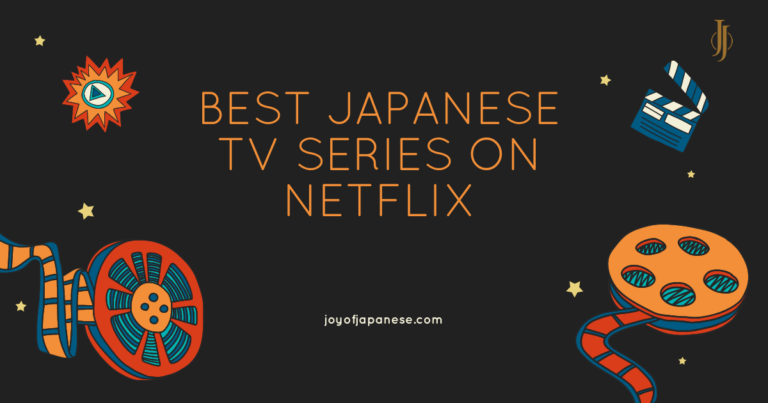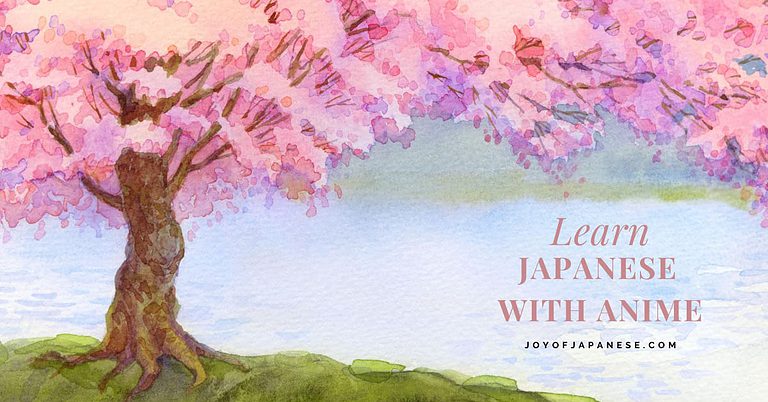Learning Japanese doesn’t have to be boring. Studying through films is a great way to make them more engaging, exciting, and entertaining. Here are 26 must-watch Japanese movies for language learners.
Movies are one of the top hobbies worldwide. The storylines, combined with the dialogue and music tracks, capture attention and can engage viewers for long hours.
From binge-watchers to occasional enjoyers, it is a way to unwind from life’s stress and rushed pace.
Most people don’t realize that this simple thing to do may be put to good use productively.
You have many incredible motivations to learn Japanese, such as scholarships to study in Japan, new career options, and cultural elements.
Learning Japanese through movies can be a fantastic way to do it. Films frequently depict a country’s culture, lifestyle, and language in their most rustic and simple form.
They portray the daily lives of the people there, providing a more accurate picture of the culture than reading about it in a book or on the internet. Of course, this also applies to learning Japanese.
Table of Contents
- Why is watching films great for learning Japanese?
- Top 26 Films for Japanese Language Learners
- 1. A Scene At The Sea (あの夏、いちばん静かな海。) — 1991
- 2. Good Morning (お早よう) — 1959
- 3. Nobody Knows (誰も知らない) — 2004
- 4. Shall We Dance (Sharu wi ダンス?) — 1996
- 5. Tokyo Story (東京物語) — 1953
- 6. Woman in the Dunes (砂の女) — 1964
- 7. Like Father Like Son (そして父になる) — 2013
- 8. Adrift In Tokyo (転々) — 2007
- 9. My Neighbour Totoro (となりのトトロ) — 1998
- 10. Our Little Sister (海街) — 2015
- 11. River’s Edge (リバーズ・エッジ) — 2018
- 12. Still Walking (歩いても 歩いても) — 2008
- 13. Departures (おくりびと) — 2008
- 14. Your Eyes Tell (きみの瞳(め)が問いかけている) — 2020
- 15. Tampopo (タンポポ) — 1985
- 16. Seven Samurai (七人の侍) — 1954
- 17. 13 Assassins (十三人の刺客) — 2010
- 18. Spirited Away (千と千尋の神隠し) — (2001)
- 19. Ringu (リング) — 1998
- 20. Shoplifters (万引き家族) — 2018
- 21. Dark Water (仄暗い水の底から) — 2002
- 22. Our Little Sister (海街) — 2015
- 23. Sweet Bean (あん) — 2015
- 24. Your Name (君の名は。) — 2016
- 25. Rashomon (羅生門) — 1950
- 26. Battle Royale (バトル・ロワイアル) — 2000
- Final Words on studying Japanese with films
Why is watching films great for learning Japanese?

There are many advantages of learning Japanese with films.
Japanese films will introduce you and help you become acquainted with the native language because they aim for movies for native speakers who are already fluent.
The language structure and flow should be precise and realistic rather than the rigid textbook. This is where movies are a great way to improve your language skills.
Historical or fantasy flicks may not always correctly reflect current speech trends. However, most modern films use everyday language that the viewer will understand.
When you listen to an actual, native speech portrayed in the movies, in that case, you are more likely to understand authentic dialogue in context.
The Japanese cinemas help you get used to those difficult accents, honorific sounds, and pronunciations. You also understand diverse dialects and standard informal and conversational phrases.
Besides ESL teaching in Japan, viewing Japanese movies can be valuable.
Unlike a dictionary or book, the movie vocabulary is heavily contextualized. Thus, you won’t have to rely only on the words to understand what’s happening.
You’ll make assumptions or educated guesses if you don’t comprehend a term. You do this based on what’s going on and visual cues like character facial expressions, which will aid you in learning other words.
You can also look at the terminology used in different situations to see when alternative terms are suitable.
The best thing is that learning Japanese is enjoyable. Viewing Japanese movies for hours on end would not bore you. It’s more satisfying than studying phrases or terminology from a textbook.
Viewing movies also stimulates both the auditory and visual senses at once. It makes it easier to remember information because our minds prefer to focus more and keep everything in a way that we enjoy.
Where to see Japanese cinema?
Many Japanese movies, TV series, and dramas are available online and through streaming services.
Japanese movies can be enjoyed on OTT services like Amazon Prime Video, Netflix, YouTube Premium, and some Japanese channels.
Many websites offer legitimate Japanese titles that you can view at your convenience. Besides, Netflix and other platforms produce original and exclusive content for their big audiences.
Top 26 Films for Japanese Language Learners
One of the fastest-growing film industries globally, production in Japan makes tons of movies every year.
The Japanese film industry produces many high-quality films, but finding relevant ones is challenging.
Here are 26 fabulous movies for learning Japanese. It can help beginners, intermediate, and advanced learners. So you can study and improve your language skills in Japanese.

1. A Scene At The Sea (あの夏、いちばん静かな海。) — 1991
This 1991 Japanese movie will inspire you with its story. It revolves around Shigeru, a deaf man who works as a garbage collector, who discovers a surfing board and sets out to learn how to surf. His deaf lover, Takako, accompanies him.
He has a string of misfortunes but never gives up. He eventually meets a veteran surfer who helps him achieve his dreams.
This movie has a few simple dialogues, making it the perfect flick to start your learning journey.
2. Good Morning (お早よう) — 1959
Learning Japanese starts right from the title of this movie, which is one of the most basic greetings to learn.
The film is called Ohayo (Good Morning in Japanese). It depicts a group of young boys who refuse to talk in protest after their parents refuse to buy them a TV set.
Oz weaves a plethora of subtle humor through a circle of familial characters portrayed as rich as those in his dramatic films. It also exposes the follies of the adult world through the eyes of its child characters.
The main characters are children. So, the movie is straightforward in language structure and vocabulary. This makes it great for beginners to learn from.
3. Nobody Knows (誰も知らない) — 2004
Nobody Knows is a heartbreaking story based on the actual events of the Sugamo child abandonment case. The plot revolves around four abandoned children: Akira, Kyko, Shigeru, and Yuki.
They have separate fathers. Since the three youngest children live there illegally, without the landlord’s knowledge or consent, they don’t go to school.
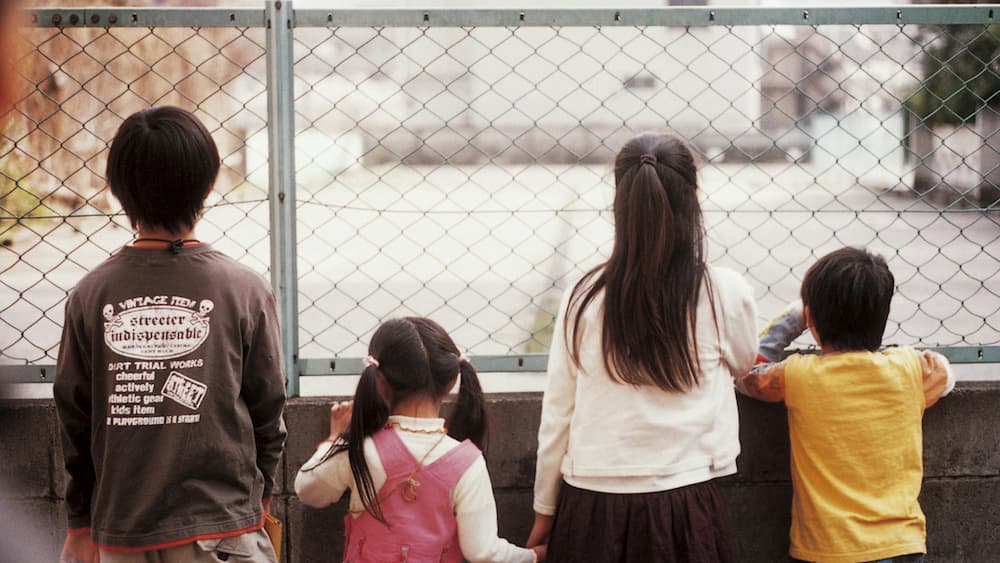
As a result, their mother abandons the children, forcing them to survive on their own for a long time. Instead, they relied solely on each other to handle the many hardships they confronted.
Besides the incredibly moving plot, the language is easy to understand and helpful for learning.
4. Shall We Dance (Sharu wi ダンス?) — 1996
‘Shall We Dance’ is a famous Japanese film that tells the story of Shohei Sugiyama. He is a middle-aged accountant with a lovely wife and daughter who is unsatisfied with his life.
Sugiyama sees Mai Kishikawa dancing one day and is enthralled by her beauty. The movie shows how Sugiyama falls in love with the dance teacher and is forced to enroll in ballroom dancing lessons.
The language used is pretty simple. However, it does not have solid dialects or hard Japanese, making it suitable for beginners.
5. Tokyo Story (東京物語) — 1953
This movie is an old classic in the legacy of Japanese films. Released in 1953, it depicts the story of an aged couple whose children have settled in Tokyo’s modern city.
The film beautifully portrays the impact of the world wars, generational differences on familial relations, and the importance of making time for loved ones. It relies heavily on dialogue rather than plot and action to convey its meanings.
The language is rich and extensive but easy enough to learn. So, it is a must-watch for people wanting to learn Japanese at slightly more advanced levels.
6. Woman in the Dunes (砂の女) — 1964
Another old classic is the movie Woman in the Dunes. This 1960s movie is for those who enjoy horror or thrillers. We know it for its eerie plotline that cryptically depicts life’s meaning.
The film revolves around a man trapped by some villagers in a house. They have enslaved a widow to shovel sand for them to sell eternally. Now enslaved, the man tries to devise ways to escape the house.
If the plot is not too disturbing, this movie is suitable for learning new vocabulary and sharpening your Japanese.
7. Like Father Like Son (そして父になる) — 2013
The Nonomiya family receives an unexpected phone call from the hospital. They inform them that Keita, a 6-year-old kid they’ve been parenting for six years, is not their real son. The hospital had accidentally switched the babies at birth.
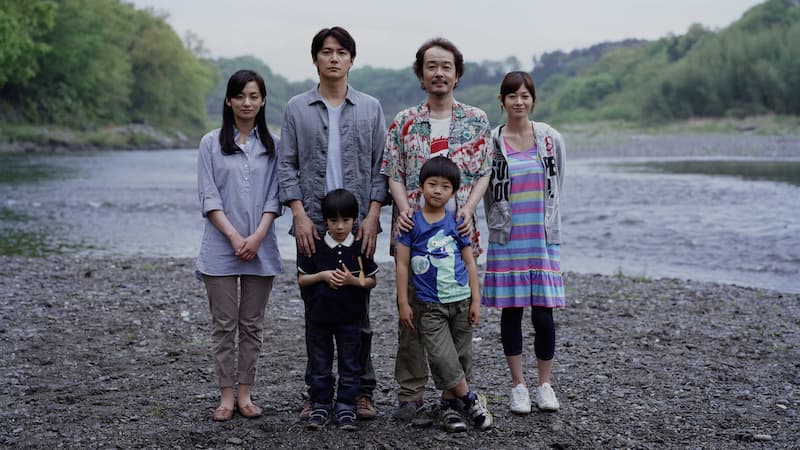
The two families agree to reunite the boys, but they soon realize that the bonds they have created are more substantial than just bloodlines.
This Japanese cinema is good for understanding the everyday conversations of family relations and the importance of human bonds.
8. Adrift In Tokyo (転々) — 2007
Adrift in Tokyo is a 2007 movie with a quirky and engaging plot. It follows the story of Takemura, a law student with no relatives or friends and no particular goals.
A Yakuza (Japanese Mafia) who has money offers him a deal. The yakuza will forgive his debt if Takemura walks around Tokyo with him.
The movie beautifully shows the entire city and will leave you wanting to visit Japan at least once. The script is uncomplicated and has mostly mundane dialogue, making it a great movie from which to learn Japanese.
9. My Neighbour Totoro (となりのトトロ) — 1998
A Studio Ghibli movie must be mentioned in the Japanese film list. My Neighbor Totoro is a classic movie by Hayao Miyazaki that portrays innocence and affection.
This cute, wonderfully animated tale of two girls and their relationship with the cuddly, friendly spirits that live in the woods near their house is a commentary on real-world themes. It includes life-threatening sickness, single motherhood, and the pleasures and tragedies of growing up.
It is excellent for learners with its simple and coherent flow.
10. Our Little Sister (海街) — 2015
In this 2015 movie, the Kouda sisters meet their stepsister Suzu for the first time at their father’s burial. Suzu’s original mother died when she was young, and her stepmother is unkind to her.
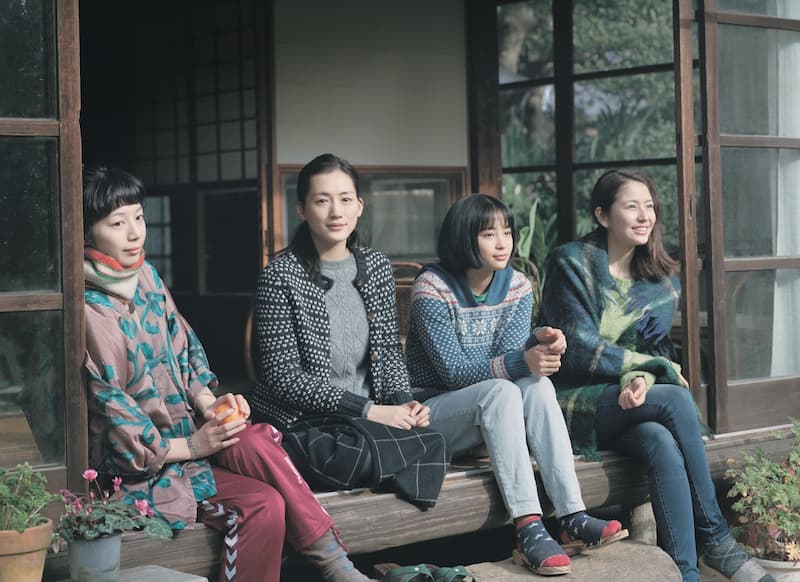
After the funeral, Sachi, the Kouda family’s oldest sister, returns Suzu to their rural home. Their time together in the house helps them heal their childhood wounds and scars.
Like every other movie exploring family bonds and siblings, the dialogue is simple to follow and relatable to daily life.
11. River’s Edge (リバーズ・エッジ) — 2018
River’s Edge is a film version of Kyoko Okazaki’s early 1990s cult manga. This is the story of a group of high school students with various troubles, ranging from bulimia to suicidal ideation. Yet, the film doesn’t tone down the provocative nature of the manga.
It depicts the dark side of peer relationships and the pressures students encounter at school and otherwise, naturally and realistically.
The characters in this film sound like genuine Japanese teens. However, high school kids in the Tokyo suburbs may not curse as much or use as many drugs in real life.
It is an excellent film for learning Japanese as contemporaries use it. So whether you are learning for a hobby or wish to make a career in the Japanese language, you should watch it.
12. Still Walking (歩いても 歩いても) — 2008
Another family-based movie, Still Walking, questions and rediscovers the meaning of what makes a family.
The plot revolves around how the Yokoyama family gathers yearly to commemorate the loss of Junpei, the oldest son. The latter drowned while attempting to save a youngster from the water.
Although everyone in the family appears to get along, the fact is that they seldom speak or see each other. Despite this, they are still a family; they quarrel, make peace with one another, disagree, and compromise.
Yet again, the conversations based on routine and day-to-day family matters make it a good movie for beginners.
13. Departures (おくりびと) — 2008
Released in 2008, this movie is a globally acclaimed and award-winning film. The translation of the Japanese title refers to a group whose duty is to prepare the bodies of those who have passed away.

This film is thought-provoking, compassionate, and heartbreaking despite its gruesome-sounding meaning. After losing his job, the movie follows a cellist compelled to start a new occupation: ceremonially preparing bodies for cremation.
This movie is ideal for understanding Japanese and how native speakers do it. It uses many spoken phrases or words rather than textbook vocabulary, making it the go-to film for beginners.
14. Your Eyes Tell (きみの瞳(め)が問いかけている) — 2020
Your Eyes Tell a heart-warming and beautiful story about love. It follows the story of Akari, who is blind, and a former kickboxer named Antonio. They fall in love but have a twisted connection to fate, as Antonio was involved in the accident that blinded Akari.
Out of guilt and love towards her, he works extra hard to win the championship that will give him the money for her treatment.
Besides the beautiful plot, the focus on pronunciation and simple vocabulary make it a good movie from which to learn Japanese.
15. Tampopo (タンポポ) — 1985
Tampopo is a Japanese classic comedy released in 1985. The title translates to ‘dandelion,’ which seems appropriate given that the film is about a poor ramen shop owner. With the help of a new friend, he sets out to enhance the quality of her offerings.
Their journey involves arguments, mishaps, and accidents that lead to the brink of death, trials and errors, and comedy. The language is easy to understand, but the film has several sophisticated ideas that keep your attention on the edge of your seat.
Aside from the language, it provides some interesting insights into Japanese culture, like its concern with food.
16. Seven Samurai (七人の侍) — 1954
What exquisite storytelling! The 1954 masterpiece Seven Samurai, directed by Akira Kurosawa, is a three-and-a-half-hour epic. It has inspired countless films throughout the 20th century.
That is the only black-and-white movie that I have seen several times. I will not hesitate to say that it is my favorite all-time Japanese film.
The story of Seven Samurai is about a poverty-stricken village frequently attacked by bandits. The villagers recruit a group of seven mighty Samurai to fight against them. Unfortunately, the victory is a Pyrrhic one, in which everyone loses, and only the peasants win.
The fantastic adventure with an irresistible story, astonishing action scenes, and splendid acting make this a must-see Japanese movie. Watching it once will change your outlook on classic cinemas.
The dialogues are tricky to understand since the variation differs from the modern Japanese version. But, the slow-paced talks provide enough time to understand the pronunciation and sentences.
17. 13 Assassins (十三人の刺客) — 2010
It is an action-packed, historical movie about the thirteen Samurai. They came together to stop the works of an evil lord when Japan operated a feudal system.
The 13 Assassins is an action film with many brutal fight scenes that do not deviate from the storyline. The last fight scene lasts over 40 minutes. Make sure not to miss it.
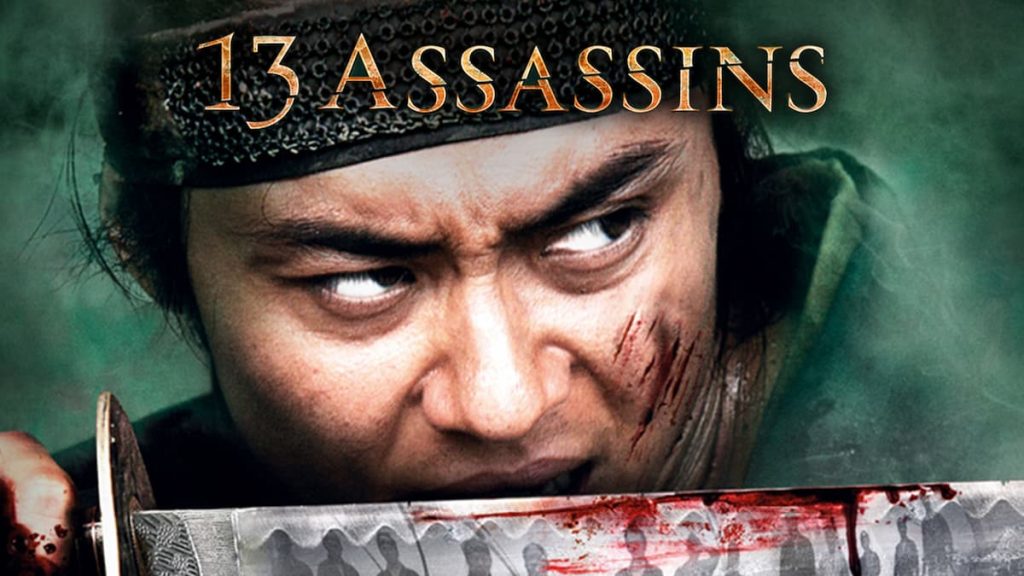
The flick used archaic and harsher words rather than the traditional samurai intonation. As a result, the film is like watching a French movie from the 1900s instead of a 21st-century one.
This movie will provide a new perspective on Japanese history, especially the Shogun era.
18. Spirited Away (千と千尋の神隠し) — (2001)
Those who love animation and spiritism should watch this film. After seeing her parents turn into pigs, a young girl fights for survival in the spirits’ world.
Although some may find the film’s narrative unsettling, it is one of the best fables ever from the Land of the Rising Sun. This is why it won the 2001 Academic Awards for Best Animation.
The film has plenty of easy-to-understand vocabulary and illustrative patterns of speech. In addition, the dialogues help enhance your articulation, intonation, and vernacular tongue.
19. Ringu (リング) — 1998
Ringu is one of Japan’s silver screen’s most famous horror movies. Thus, it is the ideal movie for learning Japanese who love watching horror films.
The R-rated movie showcases a bizarre and horrifying videotape that kills and destroys anyone who sees it. The only exception is unless it can crack the mystery covering it.
Ringu, a Hollywood remake called “Ring,” is a flick that puts you in a problematic situation of not missing out. So, if you are looking for a Japanese horror movie, watch this.
The movie contains many wonderful phrases, syntax, and excellent vocabulary flow. This is suitable for both beginners and intermediate Japanese language students. It gives lots of room to grasp the underlying meaning.
20. Shoplifters (万引き家族) — 2018
In the drama genre, Shoplifters is an award-winning and popular film. An abject poverty-stricken family is the subject of the film. Shoplifting is the only way to escape poverty.
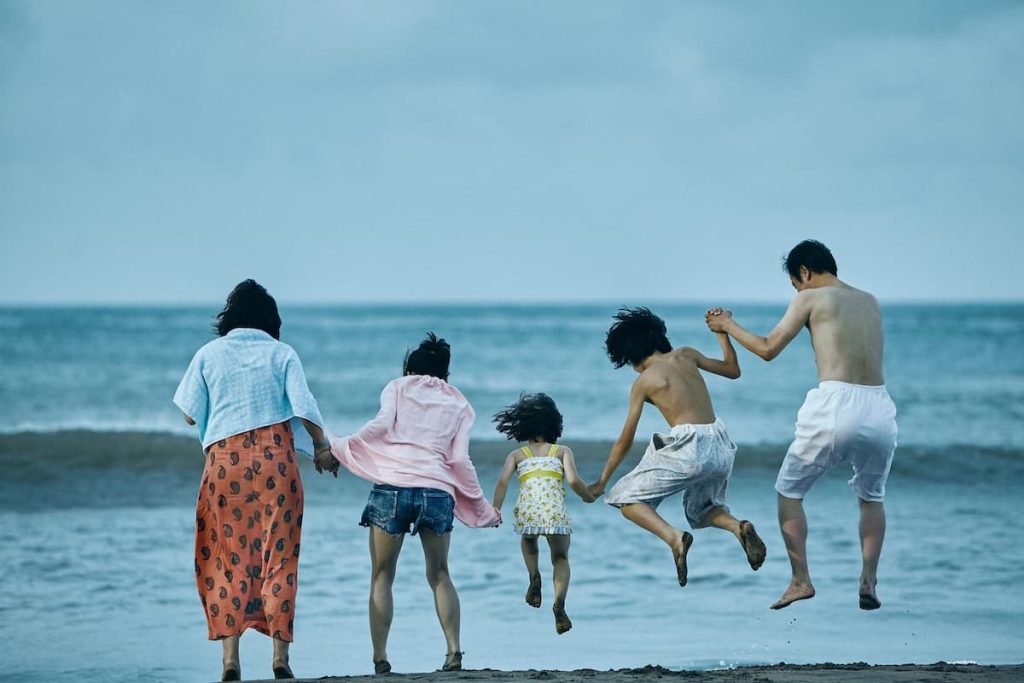
The movie is fascinating because it challenges the stereotypes that dominate Japanese society. For example, Japanese culture greatly emphasizes a family’s name, blood, and image.
The film centers on family, but the storyline implies that family may not always be the best blood. In the movie, children are neglected and abused, an issue facing Japan today. It also shows how poverty is often overlooked and overlooked.
Watching the Shoplifters is a great way to see Japan differently.
It’s easy to follow the speakers’ speech patterns and words, as their actions often follow their words. This movie can be helpful if you are preparing for the NAT test.
21. Dark Water (仄暗い水の底から) — 2002
This thriller is a must-watch for horror movie fans. Yoshimi is a divorced mother who is the movie’s main character. After her daughter, Ikuko, separated, she moved into a separate apartment.
There is another apartment above hers; even though it looked abandoned, there was a leak. Strange and horrific things began to happen to the lady as she continued to live in her apartment.
She soon learned that a certain young girl had died in that flat. The film Dark Water examines single mothers’ challenges in Japan and the relationship between parents and children.
The language is simple, with everyday vocabulary, verbs, and phrases. You can use this to prepare for the JLPT tests N4 and N5.
22. Our Little Sister (海街) — 2015
A must-watch Japanese family drama is Our Little Sister. Following the death of their father, three sisters came to terms with how to accept a sibling.
Despite the sisters’ already blossoming bond, the estranged arrival will determine its length and effectiveness.
They set Japanese family dramas up daily, making them effortless to follow. This makes the movie friendly for someone who wishes to learn the Japanese language. Besides, it has an exact and solid vocabulary.
23. Sweet Bean (あん) — 2015
Sweet Bean is your dish if you enjoy food and want to watch a film in a language. The motion picture tells the story of a man who runs a small dorayaki shop based on a simple storyline.
There’s nothing sweeter than red bean paste in this Japanese pastry. Known as Sentaro, this man hires a woman specializing in bean-paste delicacies.
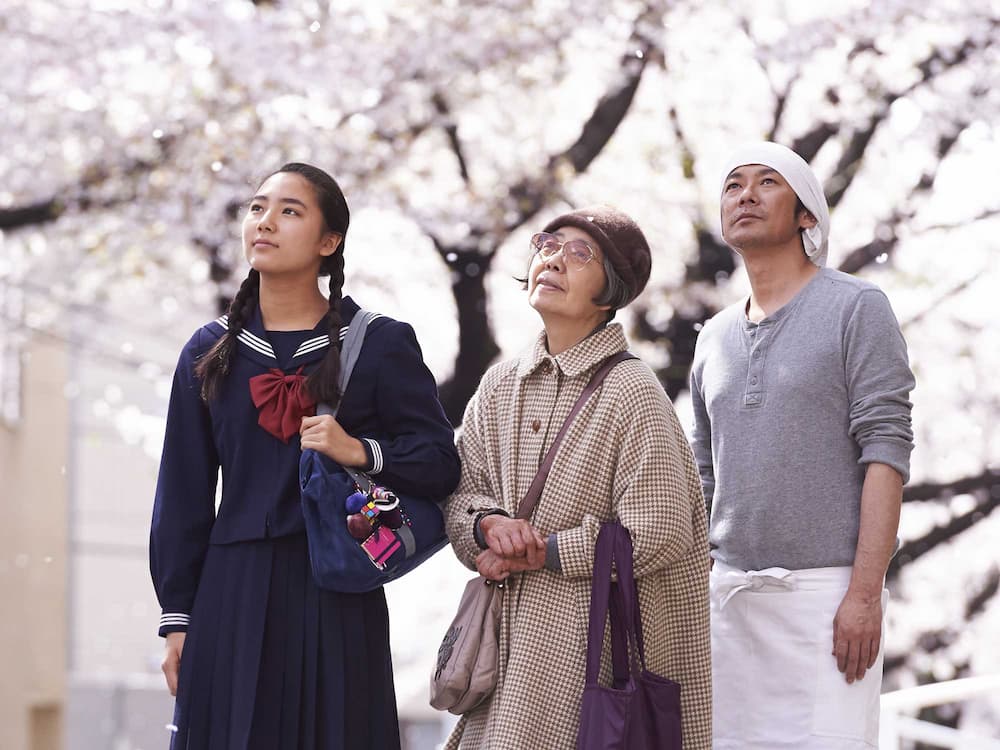
He removes Tokue from the job when he learns she has an illness. The film explores how discrimination isolates people from society. Sweet Bean is an incredible masterpiece by an acclaimed filmmaker. It is beautifully shot.
The speech pattern and language use are less complex. This is good for beginners who want to learn about Japan’s prejudices and history and improve their Japanese language skills.
24. Your Name (君の名は。) — 2016
J-dramas offer plenty of intrigue for drama buffs, and this is no exception.
Taki and Mitsuha, two high school friends, swap bodies when they wake up from sleep. Today, Taki is Taki; tomorrow, she is Mitsuha, and Mitsuha is Taki.
In that way, it affected their lives when they started texting each other and leaving notes behind. The result was a nostalgic, fantasy, and heartfelt love story with a comet.
Because the drama is young, it is easier for those learning Japanese to understand the language.
25. Rashomon (羅生門) — 1950
A list of the best movies to learn Japanese is incomplete without mentioning Rashomon by filmmaker Akira Kurosawa.
This is one of the greatest Japanese films ever made. This movie introduced Japanese cinema to the world.
Different witnesses of a crime present the same story four times. Each person tells the story differently. We see the stories in flashbacks as the characters narrate them.
Who is telling the truth? Are they all lying, or is there one speaking the truth? Kurosawa handles this with absolute mastery. This is a brilliant masterpiece from a gifted director.
The movie uses many old Japanese words, which is tricky to understand. Still, it can be beneficial if you are at an advanced level and preparing for a Japanese proficiency test, JLPT N2 or N1.
26. Battle Royale (バトル・ロワイアル) — 2000
A 1999 novel by Koushun Takami inspired Battle Royale. It is an action-thriller film directed by Kinji Fukasaku.
In recent decades, Battle Royale has become one of the most influential Japanese films worldwide. The flick was nominated and won many awards.
It is an adventure drama in which the Japanese government captures a class of ninth graders in the future and forces them to kill each other under the revolutionary “Battle Royale” act.
The language isn’t that simple and is meant for at least intermediate learners. Still, you can learn some handy vocabulary and sentences.
Final Words on studying Japanese with films
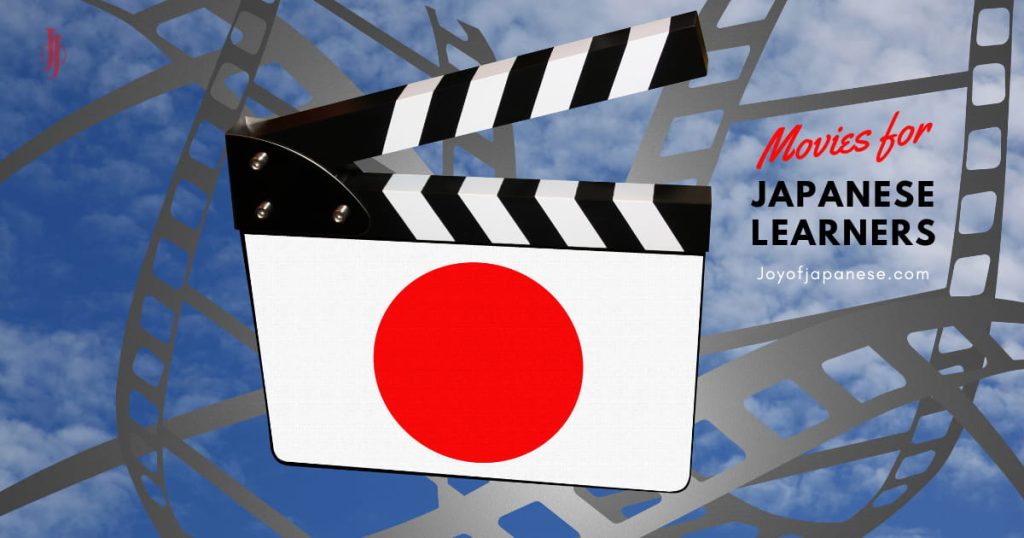
If you feel like studying has become dull, why not surprise it with some flicks? Watching Japanese movies is a great way to learn the Japanese language.
That list of 26 films will be a stepping stone in your quest to learn the language. It will also help you get accustomed to Japan’s traditions and culture.
Pleasurable things like movies can be a great learning opportunity with the correct focus and time investment. So, get started on the fun journey to mastering the Japanese language!
If you have questions or want to share suggestions, write in the comment section below.


